七下Unit 5 Why do you like pandas?知识点复习课件(共30张PPT)
文档属性
| 名称 | 七下Unit 5 Why do you like pandas?知识点复习课件(共30张PPT) | 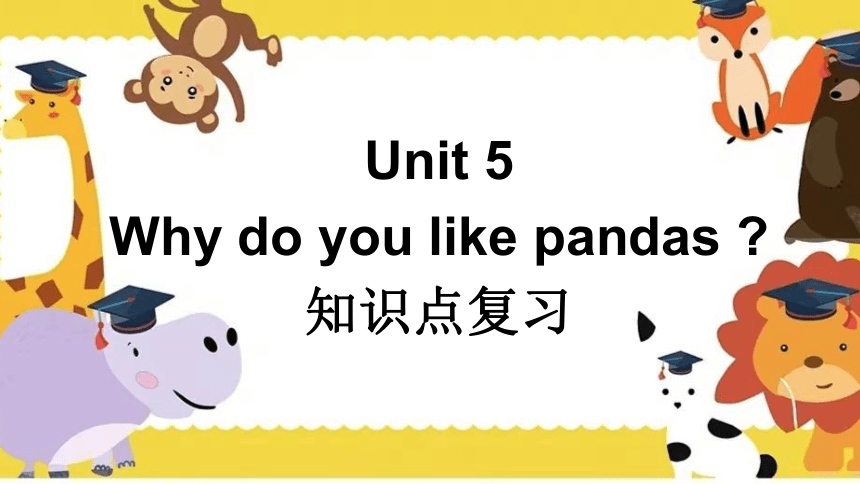 | |
| 格式 | zip | ||
| 文件大小 | 352.1KB | ||
| 资源类型 | 教案 | ||
| 版本资源 | 人教新目标(Go for it)版 | ||
| 科目 | 英语 | ||
| 更新时间 | 2023-04-06 11:25:24 | ||
图片预览

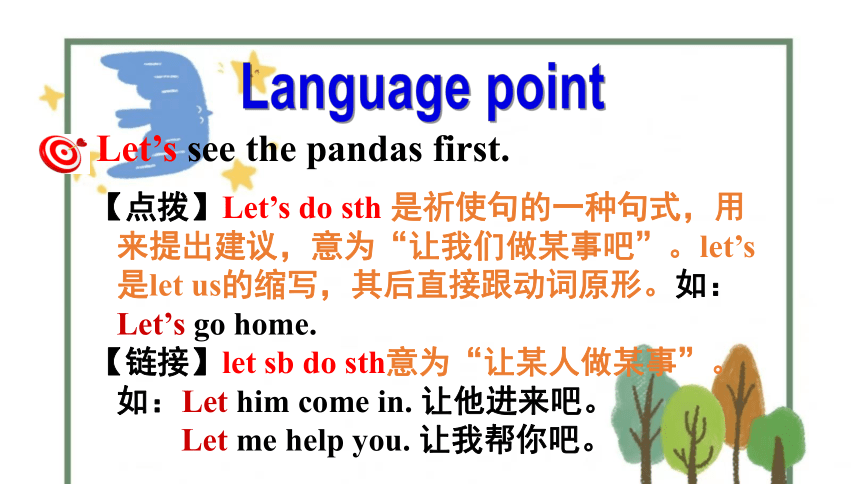
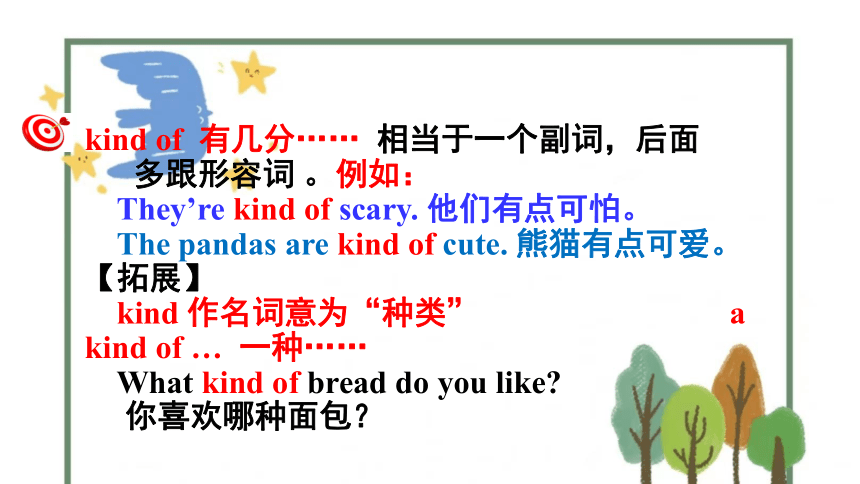
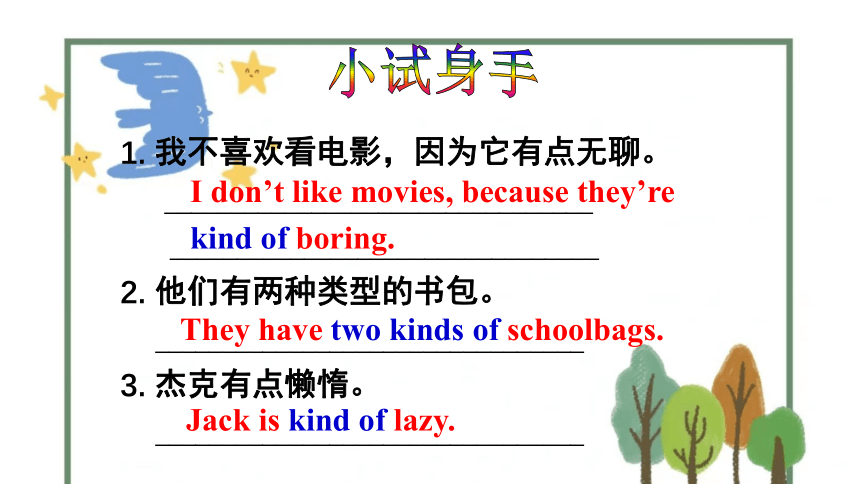
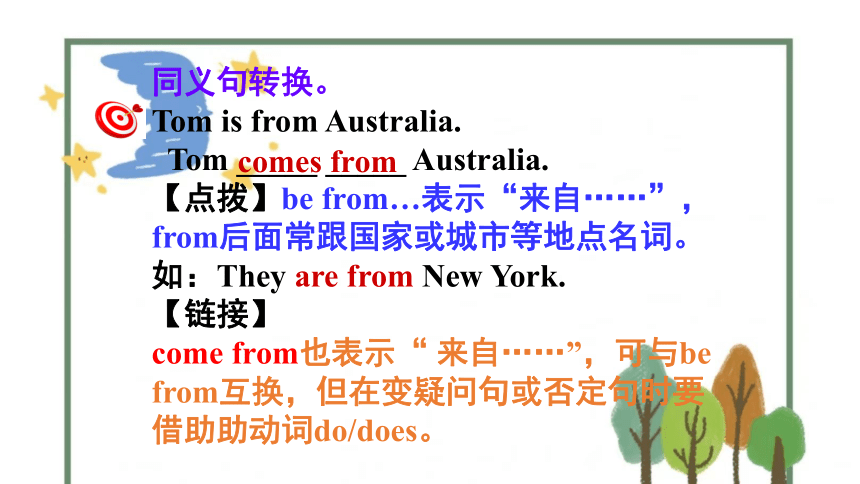
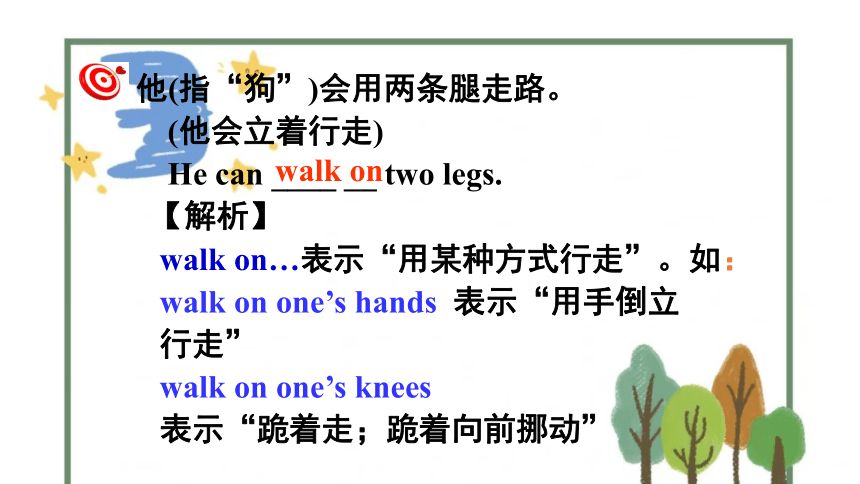
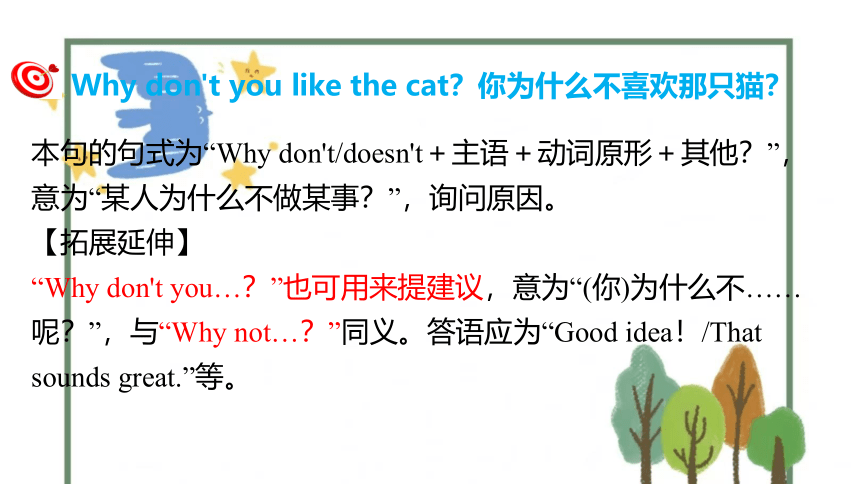

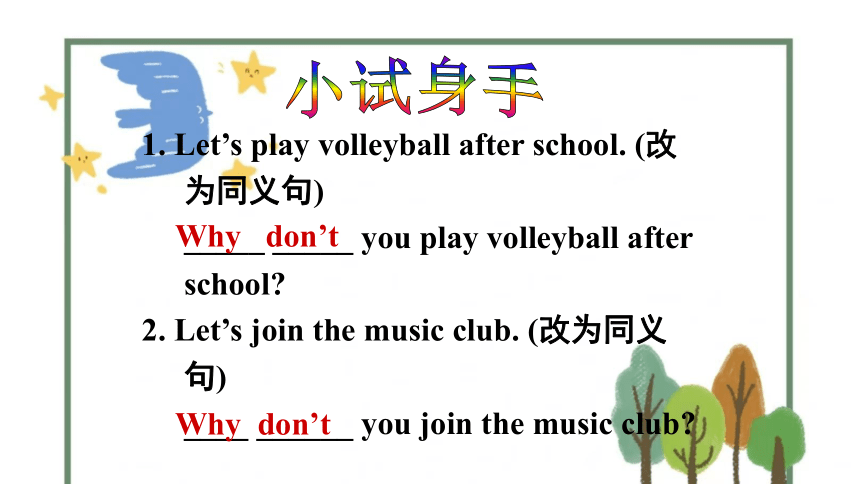
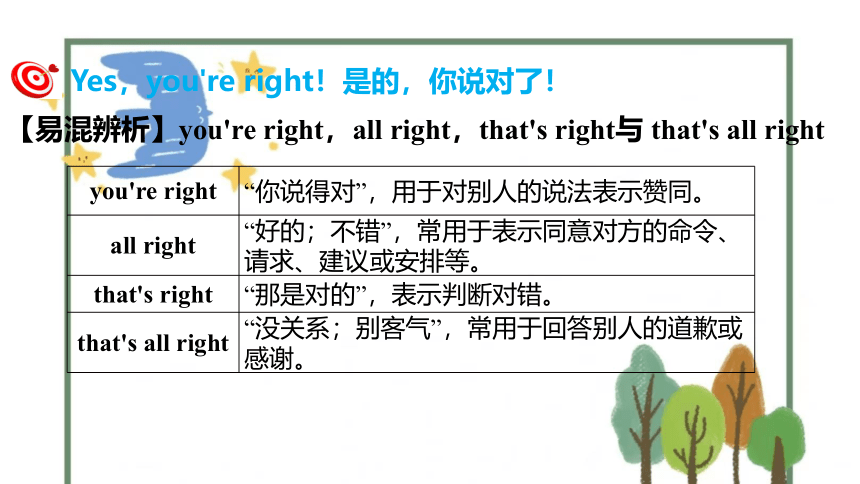
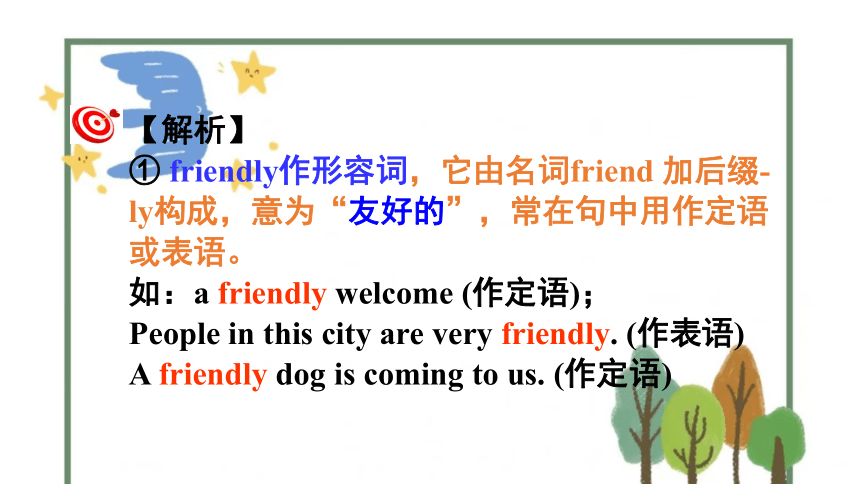
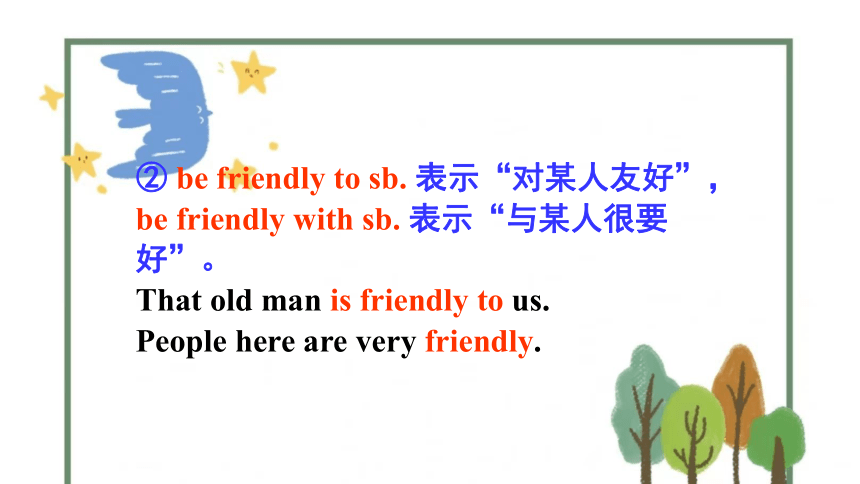
文档简介
(共30张PPT)
Unit 5
Why do you like pandas
知识点复习
【点拨】Let’s do sth 是祈使句的一种句式,用
来提出建议,意为“让我们做某事吧”。let’s
是let us的缩写,其后直接跟动词原形。如:
Let’s go home.
【链接】let sb do sth意为“让某人做某事”。
如:Let him come in. 让他进来吧。
Let me help you. 让我帮你吧。
Language point
Let’s see the pandas first.
kind of 有几分…… 相当于一个副词,后面
多跟形容词 。例如:
They’re kind of scary. 他们有点可怕。
The pandas are kind of cute. 熊猫有点可爱。
【拓展】
kind 作名词意为“种类” a kind of … 一种……
What kind of bread do you like
你喜欢哪种面包?
1. 我不喜欢看电影,因为它有点无聊。
________________________________ ________________________________
2. 他们有两种类型的书包。
________________________________
3. 杰克有点懒惰。
________________________________
I don’t like movies, because they’re kind of boring.
Jack is kind of lazy.
They have two kinds of schoolbags.
小试身手
同义句转换。
Tom is from Australia.
Tom _____ _____ Australia.
【点拨】be from…表示“来自……”,from后面常跟国家或城市等地点名词。如:They are from New York.
【链接】
come from也表示“ 来自……”,可与be
from互换,但在变疑问句或否定句时要借助助动词do/does。
comes from
他(指“狗”)会用两条腿走路。
(他会立着行走)
He can ____ __ two legs.
【解析】
walk on…表示“用某种方式行走”。如:
walk on one’s hands 表示“用手倒立
行走”
walk on one’s knees
表示“跪着走;跪着向前挪动”
walk on
Why don't you like the cat?你为什么不喜欢那只猫?
本句的句式为“Why don't/doesn't+主语+动词原形+其他?”,意为“某人为什么不做某事?”,询问原因。
【拓展延伸】
“Why don't you…?”也可用来提建议,意为“(你)为什么不……呢?”,与“Why not…?”同义。答语应为“Good idea!/That sounds great.”等。
Why don’t you drink some tea
为什么不喝点茶呢?
“Why don’t you + 动词原形” 的同义句可以说:Let’s … 例如:
Let’s take a walk. 让我们去散步吧。
Let’s drink some tea. 让我们喝点茶吧。
1. Let’s play volleyball after school. (改 为同义句)
_____ _____ you play volleyball after school
2. Let’s join the music club. (改为同义 句)
____ ______ you join the music club
小试身手
Why don’t
Why don’t
Yes,you're right!是的,你说对了!
【易混辨析】you're right,all right,that's right与 that's all right
you're right “你说得对”,用于对别人的说法表示赞同。
all right “好的;不错”,常用于表示同意对方的命令、请求、建议或安排等。
that's right “那是对的”,表示判断对错。
that's all right “没关系;别客气”,常用于回答别人的道歉或感谢。
【解析】
① friendly作形容词,它由名词friend 加后缀-ly构成,意为“友好的”,常在句中用作定语或表语。
如:a friendly welcome (作定语);
People in this city are very friendly. (作表语)
A friendly dog is coming to us. (作定语)
② be friendly to sb. 表示“对某人友好”,
be friendly with sb. 表示“与某人很要好”。
That old man is friendly to us.
People here are very friendly.
【例句】
1. He speaks in a friendly way.
2. Miss Zhou is friendly to us.
3. The students in our class are friendly
with each other.
【练习】用所给单词的适当形式填空。
People here are very ________(friend).
friendly
one of + 名词复数形式 意为“……之一”
Jack is one of my friends. 杰克是我的朋友之一。
【注意】当“one of + 名词复数形式”作主语
时,当作整体看,用单数。
One of the lions is from Africa.
狮子中的一只是来自非洲。
get lost 迷途;迷路
The little girl can’t find her home.
She gets lost.
小女孩找不到家了,她迷路了。
be in (great) danger 处于(极大)危险之中。
The boy falls into the lake. He’s in great
danger.
小男孩落入湖中, 他处于极大危险中。
People say that “an elephant never forgets”.人们说“大象从来不会忘事”
forget作动词,意为“忘记;遗忘”,其后可接名词、代词、动词不定式或动词-ing形式作宾语。forget的反义词为 remember(记住)。
forget to do sth.意为“忘记去做某事”,事情还未做
forget doing sth.意为“忘记做过某事”,事情已做
e.g. Don't forget to bring your homework here tomorrow.别忘了明天把你的家庭作业带过来。
e.g. I forgot meeting him before.我忘记以前见过他。
【易混辨析】forget与leave
forget 表示“遗忘某物”时,常指头脑中记不起某物/某事了,其后通常不与表示地点的词语连用。
leave 表示“遗忘某物”时,常指把某物忘在某地了,其后通常接地点状语。
People cut down many trees so elephants are losing their homes.因为人类大量砍伐树木,所以大象正在失去它们的家园。
cut down砍伐;砍倒
其中down为副词,后接名词作宾语时,名词放在down之前或之后均可;后接代词作宾语时,代词必须放在cut和down的中间。
e.g. Don't cut trees down.=Don't cut down trees.不要砍伐树木。
e.g.The tree is dead,so he cuts it down.
那棵树死了,所以他把它砍倒了。
【拓展延伸】cut相关的短语:
cut in插嘴 cut out删除;删去
cut up切碎 cut off切除
We must save the trees and not buy things made of ivory.我们必须拯救树木,并且不买象牙制品。
be made of意为“由……制成”,通常指制成品可以看得见原材料。
【易混辨析】be made of,be made from与be made in
be made of 意为“由……制成”,通常指制成品看得出原材料。
be made from 意为“由……制成”,通常指制成品看不出原材料。
be made in 意为“在……地方制造”。
e.g. The desk is made of wood.这张桌子是由木头制成的。
e.g. The wine is made from rice.这酒是由稻谷酿成的。
e.g. Huawei phones are made in China.华为手机是在中国制造的。
本句中的made of ivory是过去分词短语作后置定语修饰名词things,过去分词短语中的动词与所修饰的名词之间为被动关系。
单元语法点回顾
一 why,where引导的特殊疑问句
①why引导的特殊疑问句,常对原因进行提问,一般用because来回答。
— Why do you like the book 你为什么喜欢这本书?
— Because it is interesting. 因为它有趣。
②where引导的特殊疑问句,常对地点进行提问。
— Where is the schoolbag 书包在哪里?
— Under the tree. 在树下。
【拓展延伸】其他常见的特殊疑问词(组)及其用法:
what 对姓名、物品、事件等提问 What’s your name 你叫什么名字?
how 对身体状况、方式等提问 How is your mother 你妈妈身体怎样
who 对人进行提问 Who is the girl 这个女孩是谁
when 对时间进行提问 When do you get up 你什么时候起床
whose 对某物的所属者进行提问 Whose book is this 这是谁的书
how old 对年龄进行提问 How old is your father 你爸爸多大了
what color 对颜色进行提问 What color is your ruler 你的尺子是什么颜色
二 形容词的用法
形容词是表示人或事物的属性或特征的词,常用来修饰或限定名词。通常在句中作定语或表语。
作定语,修饰名词或代词one/ones, 一般位于被修饰词之前。
e.g. I only have a small handbag. I want to buy some big ones .
我只有一只小手提包。我想要买一些大的。
注意:当形容词修饰不定代词或不定副词如something、anything、somewhere、anywhere 等词,形容词要放在被修饰词的后面。
e.g.There is something new in today's newspaper.
今天报纸上有些新鲜事。
作表语,位于连系动词(be、feel、look、taste、sound等)之后,构成系表结构,说明主语的情况。
选择填空。
1. _____ pandas from China
A. Are B. Is C. Do
2.--Why do you like koala bears
--_____ they are cute and smart.
A. And B. For C. Because
3. ______ is the biggest animal on the earth.
A. The elephant B. The koala bear C. The giraffe
Exercises
4. Students ______ nine hours a day.
A. sleeps B. sleep C. are sleep
5. People usually think lions are _____ scary.
A. kinds of B. kind C. kind of
6.--Which kind of animals have long legs and neck
--_______.
A. Pandas B. Penguins C. Giraffes
7. Tigers like _____ meat.
A. eat B. eats C. eating
8. Koala bears sleep _____.
A. at night B. during the day C. at noon
9. Do you ever play _____ pandas
A. with B. to C. and
10. Foxes can count numbers. So people think
they are _____.
A. scary B. interesting C. clever
Make a survey in your family. See what animals they like and why.Write a short passage.
Unit 5
Why do you like pandas
知识点复习
【点拨】Let’s do sth 是祈使句的一种句式,用
来提出建议,意为“让我们做某事吧”。let’s
是let us的缩写,其后直接跟动词原形。如:
Let’s go home.
【链接】let sb do sth意为“让某人做某事”。
如:Let him come in. 让他进来吧。
Let me help you. 让我帮你吧。
Language point
Let’s see the pandas first.
kind of 有几分…… 相当于一个副词,后面
多跟形容词 。例如:
They’re kind of scary. 他们有点可怕。
The pandas are kind of cute. 熊猫有点可爱。
【拓展】
kind 作名词意为“种类” a kind of … 一种……
What kind of bread do you like
你喜欢哪种面包?
1. 我不喜欢看电影,因为它有点无聊。
________________________________ ________________________________
2. 他们有两种类型的书包。
________________________________
3. 杰克有点懒惰。
________________________________
I don’t like movies, because they’re kind of boring.
Jack is kind of lazy.
They have two kinds of schoolbags.
小试身手
同义句转换。
Tom is from Australia.
Tom _____ _____ Australia.
【点拨】be from…表示“来自……”,from后面常跟国家或城市等地点名词。如:They are from New York.
【链接】
come from也表示“ 来自……”,可与be
from互换,但在变疑问句或否定句时要借助助动词do/does。
comes from
他(指“狗”)会用两条腿走路。
(他会立着行走)
He can ____ __ two legs.
【解析】
walk on…表示“用某种方式行走”。如:
walk on one’s hands 表示“用手倒立
行走”
walk on one’s knees
表示“跪着走;跪着向前挪动”
walk on
Why don't you like the cat?你为什么不喜欢那只猫?
本句的句式为“Why don't/doesn't+主语+动词原形+其他?”,意为“某人为什么不做某事?”,询问原因。
【拓展延伸】
“Why don't you…?”也可用来提建议,意为“(你)为什么不……呢?”,与“Why not…?”同义。答语应为“Good idea!/That sounds great.”等。
Why don’t you drink some tea
为什么不喝点茶呢?
“Why don’t you + 动词原形” 的同义句可以说:Let’s … 例如:
Let’s take a walk. 让我们去散步吧。
Let’s drink some tea. 让我们喝点茶吧。
1. Let’s play volleyball after school. (改 为同义句)
_____ _____ you play volleyball after school
2. Let’s join the music club. (改为同义 句)
____ ______ you join the music club
小试身手
Why don’t
Why don’t
Yes,you're right!是的,你说对了!
【易混辨析】you're right,all right,that's right与 that's all right
you're right “你说得对”,用于对别人的说法表示赞同。
all right “好的;不错”,常用于表示同意对方的命令、请求、建议或安排等。
that's right “那是对的”,表示判断对错。
that's all right “没关系;别客气”,常用于回答别人的道歉或感谢。
【解析】
① friendly作形容词,它由名词friend 加后缀-ly构成,意为“友好的”,常在句中用作定语或表语。
如:a friendly welcome (作定语);
People in this city are very friendly. (作表语)
A friendly dog is coming to us. (作定语)
② be friendly to sb. 表示“对某人友好”,
be friendly with sb. 表示“与某人很要好”。
That old man is friendly to us.
People here are very friendly.
【例句】
1. He speaks in a friendly way.
2. Miss Zhou is friendly to us.
3. The students in our class are friendly
with each other.
【练习】用所给单词的适当形式填空。
People here are very ________(friend).
friendly
one of + 名词复数形式 意为“……之一”
Jack is one of my friends. 杰克是我的朋友之一。
【注意】当“one of + 名词复数形式”作主语
时,当作整体看,用单数。
One of the lions is from Africa.
狮子中的一只是来自非洲。
get lost 迷途;迷路
The little girl can’t find her home.
She gets lost.
小女孩找不到家了,她迷路了。
be in (great) danger 处于(极大)危险之中。
The boy falls into the lake. He’s in great
danger.
小男孩落入湖中, 他处于极大危险中。
People say that “an elephant never forgets”.人们说“大象从来不会忘事”
forget作动词,意为“忘记;遗忘”,其后可接名词、代词、动词不定式或动词-ing形式作宾语。forget的反义词为 remember(记住)。
forget to do sth.意为“忘记去做某事”,事情还未做
forget doing sth.意为“忘记做过某事”,事情已做
e.g. Don't forget to bring your homework here tomorrow.别忘了明天把你的家庭作业带过来。
e.g. I forgot meeting him before.我忘记以前见过他。
【易混辨析】forget与leave
forget 表示“遗忘某物”时,常指头脑中记不起某物/某事了,其后通常不与表示地点的词语连用。
leave 表示“遗忘某物”时,常指把某物忘在某地了,其后通常接地点状语。
People cut down many trees so elephants are losing their homes.因为人类大量砍伐树木,所以大象正在失去它们的家园。
cut down砍伐;砍倒
其中down为副词,后接名词作宾语时,名词放在down之前或之后均可;后接代词作宾语时,代词必须放在cut和down的中间。
e.g. Don't cut trees down.=Don't cut down trees.不要砍伐树木。
e.g.The tree is dead,so he cuts it down.
那棵树死了,所以他把它砍倒了。
【拓展延伸】cut相关的短语:
cut in插嘴 cut out删除;删去
cut up切碎 cut off切除
We must save the trees and not buy things made of ivory.我们必须拯救树木,并且不买象牙制品。
be made of意为“由……制成”,通常指制成品可以看得见原材料。
【易混辨析】be made of,be made from与be made in
be made of 意为“由……制成”,通常指制成品看得出原材料。
be made from 意为“由……制成”,通常指制成品看不出原材料。
be made in 意为“在……地方制造”。
e.g. The desk is made of wood.这张桌子是由木头制成的。
e.g. The wine is made from rice.这酒是由稻谷酿成的。
e.g. Huawei phones are made in China.华为手机是在中国制造的。
本句中的made of ivory是过去分词短语作后置定语修饰名词things,过去分词短语中的动词与所修饰的名词之间为被动关系。
单元语法点回顾
一 why,where引导的特殊疑问句
①why引导的特殊疑问句,常对原因进行提问,一般用because来回答。
— Why do you like the book 你为什么喜欢这本书?
— Because it is interesting. 因为它有趣。
②where引导的特殊疑问句,常对地点进行提问。
— Where is the schoolbag 书包在哪里?
— Under the tree. 在树下。
【拓展延伸】其他常见的特殊疑问词(组)及其用法:
what 对姓名、物品、事件等提问 What’s your name 你叫什么名字?
how 对身体状况、方式等提问 How is your mother 你妈妈身体怎样
who 对人进行提问 Who is the girl 这个女孩是谁
when 对时间进行提问 When do you get up 你什么时候起床
whose 对某物的所属者进行提问 Whose book is this 这是谁的书
how old 对年龄进行提问 How old is your father 你爸爸多大了
what color 对颜色进行提问 What color is your ruler 你的尺子是什么颜色
二 形容词的用法
形容词是表示人或事物的属性或特征的词,常用来修饰或限定名词。通常在句中作定语或表语。
作定语,修饰名词或代词one/ones, 一般位于被修饰词之前。
e.g. I only have a small handbag. I want to buy some big ones .
我只有一只小手提包。我想要买一些大的。
注意:当形容词修饰不定代词或不定副词如something、anything、somewhere、anywhere 等词,形容词要放在被修饰词的后面。
e.g.There is something new in today's newspaper.
今天报纸上有些新鲜事。
作表语,位于连系动词(be、feel、look、taste、sound等)之后,构成系表结构,说明主语的情况。
选择填空。
1. _____ pandas from China
A. Are B. Is C. Do
2.--Why do you like koala bears
--_____ they are cute and smart.
A. And B. For C. Because
3. ______ is the biggest animal on the earth.
A. The elephant B. The koala bear C. The giraffe
Exercises
4. Students ______ nine hours a day.
A. sleeps B. sleep C. are sleep
5. People usually think lions are _____ scary.
A. kinds of B. kind C. kind of
6.--Which kind of animals have long legs and neck
--_______.
A. Pandas B. Penguins C. Giraffes
7. Tigers like _____ meat.
A. eat B. eats C. eating
8. Koala bears sleep _____.
A. at night B. during the day C. at noon
9. Do you ever play _____ pandas
A. with B. to C. and
10. Foxes can count numbers. So people think
they are _____.
A. scary B. interesting C. clever
Make a survey in your family. See what animals they like and why.Write a short passage.
同课章节目录
- Unit 1 Can you play the guitar?
- Section A
- Section B
- Unit 2 What time do you go to school?
- Section A
- Section B
- Unit 3 How do you get to school?
- Section A
- Section B
- Unit 4 Don't eat in class.
- Section A
- Section B
- Unit 5 Why do you like pandas?
- Section A
- Section B
- Unit 6 I'm watching TV.
- Section A
- Section B
- Review of Units 1-6
- Unit 7 It's raining!
- Section A
- Section B
- Unit 8 Is there a post office near here?
- Section A
- Section B
- Unit 9 What does he look like?
- Section A
- Section B
- Unit 10 I'd like some noodles.
- Section A
- Section B
- Unit 11 How was your school trip?
- Section A
- Section B
- Unit 12 What did you do last weekend?
- Section A
- Section B
